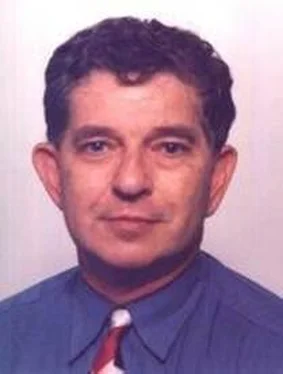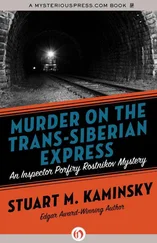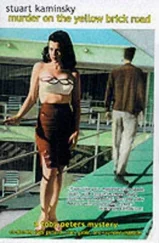Suddenly, I felt a presence behind me. I whirled around and saw the tall, white-haired man coming up the driveway, only two feet away, with a large flashlight in hand. He shined it in my eyes. “Who the hell are you?” he shouted. “What are you doing here?”
Oh, shit, I’d blown it. “Uh, hi,” I said. “I’m Naomi Weinstein. I guess I’m a little early for breakfast at Nate ’n Al’s.”
“Oh, Christ,” he sighed. “We’ve blown it,” he shouted to the others, who were still inside.
“Shit,” shouted Biberman. Jarrico threw up his hands.
“No, no,” I said quickly. “I’m not going to tell anybody. And I’m sure my friend isn’t either.”
“Then why did you follow us here?” Wilson demanded.
“I was only hired to find out one thing.”
“Yes?”
“Who wrote The Brave One ? Who deserves the Academy Award?”
Wilson laughed. “And Trumbo sent you to me?”
I nodded.
He doubled over laughing some more. He told the others through the window and they laughed, too.
Finally it became quiet enough for me to ask, “Why is that funny?”
“Trumbo wrote The Brave One, ” said Wilson. “He’s just trying to get extra publicity over it by confusing everyone.”
“Are you sure?”
He shook his head. “I can’t be sure. That’s Trumbo’s master plan. He’s trying to shame Hollywood into ending the blacklist without exposing the people who buy our work.”
I did have breakfast at Nate ’n Al’s, the New York-style deli in the middle of Beverly Hills. But with David instead of Wilson. During which David pointed out to me that neither Wilson nor Trumbo was Jewish, so my theory about everyone in Hollywood being so must be wrong.
I wrote up my report on David’s Smith-Corona standard-mentioning nothing about the Wilson-Jarrico-Biberman odyssey-and handed it to Norman Chandler in person in his palatial office at the L.A. Times . He was an imposing man, reminded me of Franklin Roosevelt. He read it. “There’s not one actual admission in here. Trumbo says Wilson. Wilson says Trumbo. It’s all a farce,” he said.
“I think that was the idea,” I added.
“That fucking Trumbo, pardon my French,” he muttered, handing me a generous check for my services and expenses. Still, I had a feeling he wasn’t about to give me a glowing reference.
David dropped me off at the train and kissed me goodbye almost as if he meant it.
I read two Agatha Christies and a Raymond Chandler as the train took me back across the country. I guess it hadn’t been my shining hour. Or my country’s.
Note
Except for Naomi’s involvement, all of the events of the story are true, although I’ve tampered slightly with the timeline.
When Salt of the Earth was finally, against all odds, completed, it was blocked from distribution in the United States by the studios and the IATSE-which forbade all the union projectionists in every movie theater in the country from running it-while it went on to win the French equivalent of the Oscar as Best Motion Picture of the Year.
In 1958, the year after The Brave One debacle, another blacklisted writer, Ned Young, won the Oscar for The Defiant Ones under a pseudonym. In 1959 Kirk Douglas hired Dalton Trumbo under a pseudonym to write Spartacus for $50,000, and they let the story leak. Soon Otto Preminger hired Trumbo to write Exodus under his own name. And the blacklist was effectively over for Trumbo, Wilson, and the few other best known of the hundreds of writers, directors, actors, craftsmen and women who’d been drummed out of Hollywood. But the lesser known vast majority of them never worked in the motion picture industry again.
In 1973 Trumbo was finally given his Oscar for The Brave One . He was presented an Oscar for his earlier pseudonymous writing of Roman Holiday many years after his death.
The Writers Guild has spent the last twenty-six years trying to correct the credits on films made during the years of the blacklist.
The research and columns of Patrick Goldstein of the L.A. Times and recollections of Christopher Trumbo (the boy on the Schwinn) contributed immeasurably to this history.
Murder at the Heartbreak Hotel by MARK TERRY
WHEN FATE BLOWSopen a shamus’s office door, you can never tell who’ll walk through. It could be a hot dame in a cool silk dress or a gun-packing gangster intent on harm.
It could even be Elvis.
I WAS CONTEMPLATINGmy checkbook when my office door swung open and Alicia Kingston stepped through. I dropped the black hole of my checkbook into the desk drawer where I kept the bottle and smiled pleasantly at the woman. “May I help you?”
“You’re Jakob Hull, the private investigator?”
“Yes ma’am. Have a seat.”
She plopped into one of my two office chairs, tucking a lock of her short, curly blond hair behind one ear. “You… you’re confidential, right?”
“What you tell me will be private,” I said.
She was maybe in her thirties, maybe in her forties. It was kind of hard to tell. She had the kind of voluptuous figure that was no longer fashionable-it disguised her age but didn’t hurt her sex appeal. “I mean… really private,” she said.
“Really private,” I agreed.
“Really, really private?” She had a wispy voice, like a little girl’s voice, and it went with her slightly plump body and vaguely innocent blue eyes.
“Yes ma’am,” I said. “But maybe I’ll know more when you tell me what you’d like me to do.”
“Oh. Well…” She rummaged in her Nebraska-size purse and retrieved a large mailing envelope. “Do you… can you find people?”
“Yes,” I said, once again back on firm ground. “Is there someone you’d like me to find?”
“Yes,” she said.
I waited for her to tell me who she wanted me to find, but she was going to be one of those clients and it was going to be one of those days.
“Who is it you’d like me to find?” I finally asked.
“Elvis,” she said.
I first shifted my gaze to the window, which offered no inspiration, then to my framed private investigator’s license, which offered even less.
With a sigh, I said, “Elvis, uh, who?”
“Elvis Presley,” she said, which was exactly what I was afraid she’d say.
I thought that over, debating responses. The first one that came to mind was: “Have you tried Graceland?”
The second one was along the lines of: “Get out of my office,” with a colorful metaphor or two inserted somewhere in the middle of the sentence for emphasis.
Then I remembered my checking account balance and said, “Elvis Presley,” which wasn’t a question, merely a statement, and a repetitive one at that.
“Why yes,” she said.
“ The Elvis Presley,” I said, cautiously narrowing it down.
“Of course,” she said. “The King.”
“That one,” I said.
I thought of the checkbook. I thought of the bottle in the bottom drawer of my desk. They were inherently related, these two thoughts.
Alicia Kingston reached into the envelope and retrieved a snapshot. “This is the man I want you to find.”
I examined it gingerly. It sure looked like Elvis Presley. “Where did you get this?” I asked.
“In Detroit. At Cobo Hall. There was a convention of Elvises.”
Ah-ha! A clue! My God! A clue! “So,” I said. “This person is an Elvis impersonator.”
“Oh no. He’s the real thing. Elvis Presley. I saw his driver’s license.”
One step forward; two steps back.
“When, uh, did you see his driver’s license?”
Читать дальше












